Honda CBR150R-ABS VS Yamaha R15-V3-ABS Feature Comparison
This page was last updated on 21-Aug-2025 02:33pm , By Arif Raihan Opu
In the sportbike segment, Honda and Yamaha ruling tough in Bangladesh. Both of their CBR150R and R15-V3 fighting hard with their unmatched features and dedicated characteristics. Hence in this battle, the new ABS variant from both stable just put some fuel. Thus, the excitement raised to the peak among the enthusiasts. Sequentially, here we came with the brief in Honda CBR150R-ABS VS Yamaha R15 V3 Feature Comparison Review.
Honda CBR150R-ABS VS Yamaha R15-V3-ABS Feature Comparison
Before heading to the discussions on the newly added features and enhancements, we hereby through the comparative specification table of the bikes. Hereby you would see notable specific differences among the bikes. Further, if you go through the details of each bike you will find a few more differences in the new versions. And of course, those are tweaked to cover new refinement standards.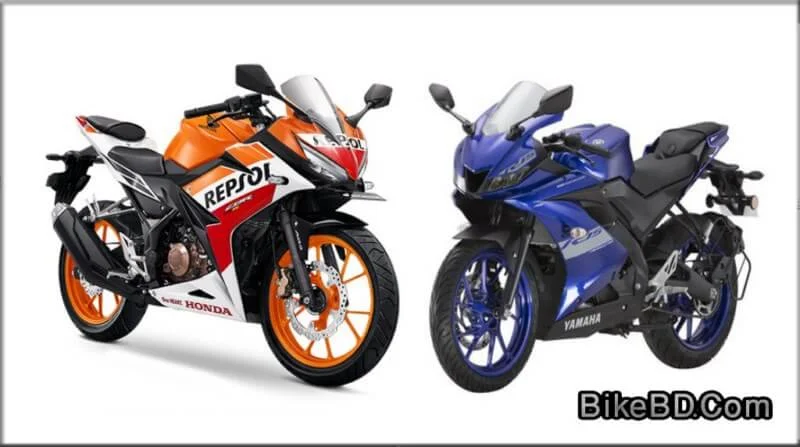
Also Read: Honda CBR 1000 F (1994) Price In BD
Honda CBR150R-ABS VS Yamaha R15-V3-ABS Specification Comparison Table
*All the specifications are subject to change upon company rules, policy, offer & promotion. BikeBD is not liable for the changes.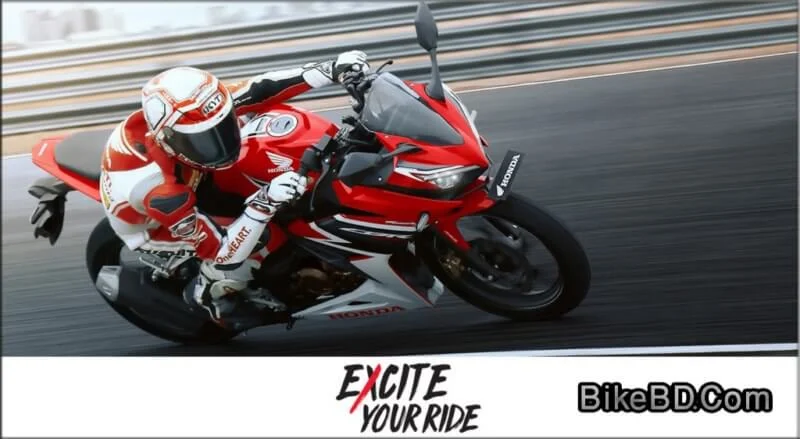
Also Read: Honda CBR 1000RR price in BD
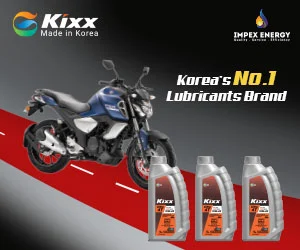
Honda CBR150R-ABS VS Yamaha R15-V3-ABS Got A New Look
In the basic design, both the Honda CBR150R-ABS and Yamaha R15-V3-ABS remaining the same as featured in previously. But in the new ABS versions, both the machine got a new look and appearances. Both of them updated with few exterior enhancement and all-new color & graphics scheme. Hence, both the new versions got a different identity.
In the Honda version, the machine got few exterior enhancements like a new design extension at the front end. The headlamp assembly is redesigned with sharper aerodynamics. Thereby the headlamp design changed a bit and the new windshield extended up to a new height. Further, the digital instrument cluster also updated with sharper and new backlit illumination.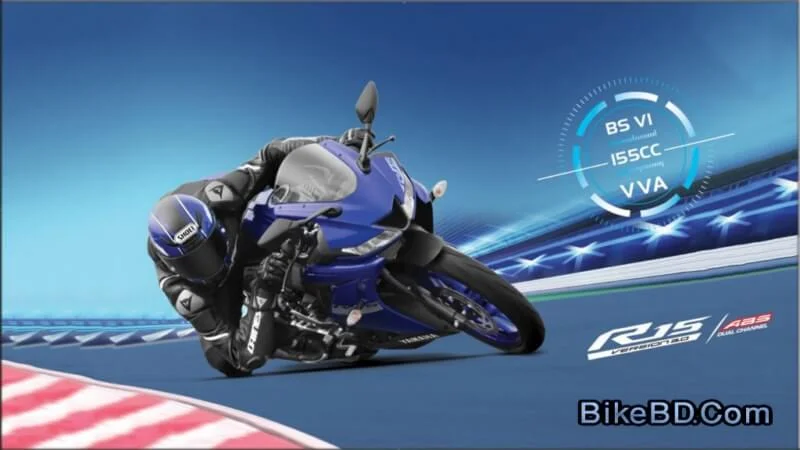
Also Read: Honda CBR600RR 2015 Price in BD
On the other side, Yamaha R15-V3-ABS got a bundle of localized enhancements as it reproduced in India. Hence the new version carries a different exterior setup than the Indonesian non-ABS version. This ABS(Anti-lock braking system) version featured with quite a different dimension in the front end, therefore, headlamp housing and windshield. Further, new rear tire hugger, sharee-guard installed including different color schemes.Frame, Wheel, Brake & Suspension System
In the frame, wheel, brake, and suspension system both the Honda CBR150R-ABS VS Yamaha R15-V3-ABS comes with new enhancements. They are holding the same Diamond Truss Frame and Delta-Box Frame in CBR150R-ABS and R15-V3-ABS as were previously. The wheel size and tire dimensions also remaining the same as previous in the ABS variant.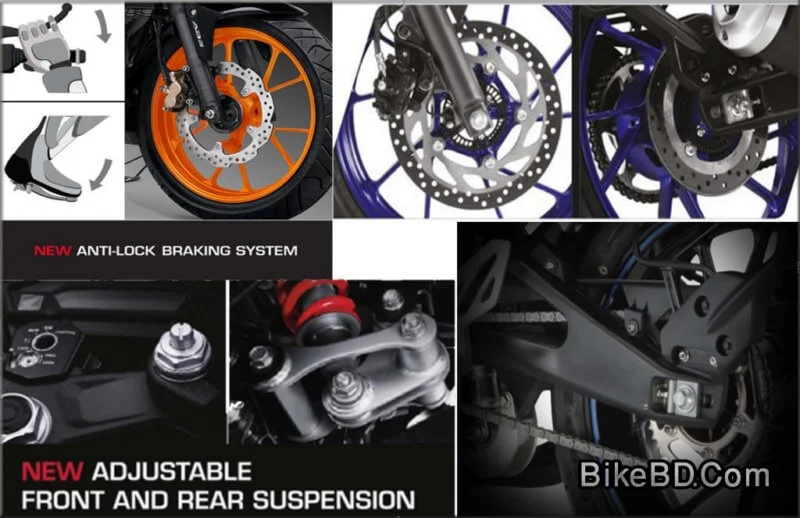
Also Read: Honda CBR 1000 F (1998) Price in BD
The core enhancement comes in their braking features and massive changes done in their front suspension system. Both the motorcycle holding the same previous dimension of hydraulic disc braking setup at their both wheels. But both Honda CBR150R-ABS and Yamaha R15-V3-ABS braking system upgraded with Dual-Channel ABS in their wheels.
In the suspension system, the CBR150R-ABS version updated with an upright adjustable telescopic-fork suspension setup at the front. It can be tuned instantly screwing from the top. On the counter, R15-V3-ABS suspension degraded with the conventional upright telescopic-fork suspension from the previous USD system. Thus, they managed to minimize the rigidity of the front setup considering Indian sub-continent road conditions. Further, at the rear both the machine holding linked type mono suspension setups.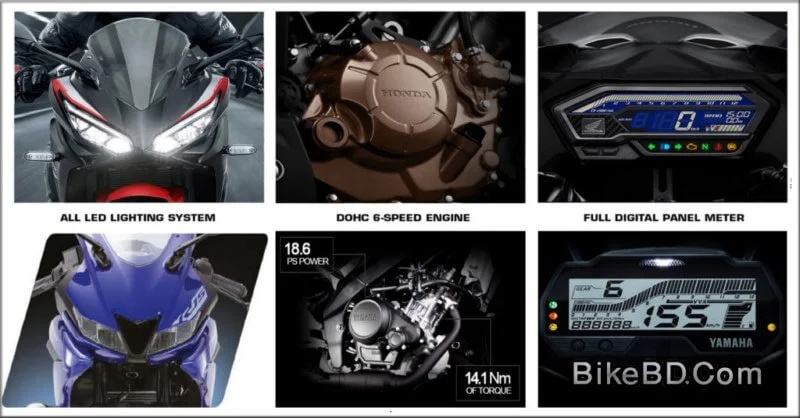
Honda CBR150R-ABS VS Yamaha R15-V3-ABS Engine & Features
In the engine and performance features, both the Honda CBR150R-ABS and Yamaha R15-V3-ABS remaining quite the same. But of-course a few mechanical and tweaking updates done in the new variant. In the Honda CBR150R-ABS, it holding the same single-cylinder, four-stroke, liquid-cooled, 4-valve, DOHC, PGM-FI engine. Yamaha R15-V3-ABS also holding the single-cylinder, four-stroke, liquid-cooled, 4-valve, SOHC version 3.0 engine.
Here CBR150R featured with Double Overhead Camshaft where R15-V3-ABS remaining with the Single Overhead Camshaft. Further, the R15-V3-ABS engine got advanced features like the VVA and Assist & Slipper Clutch system. Hence from these new versions both the machine updated with few engine tweaking and refinement. Therefore, the updates also came with their ECU mechanisms.
Whatsoever, the Honda CBR150R-ABS tuned for 12.6kW(17.1PS) of power and 14.4NM(1.47kgf-m) of torque. On the counter, Yamaha R15-V3-ABS (BS-IV) engine tweaked for 14.2kW(19.3PS) of power and 14.7NM(1.5kgf-m) of torque. Further, the new ECU upgrades also resulted in a better fuel economy in both motorcycles.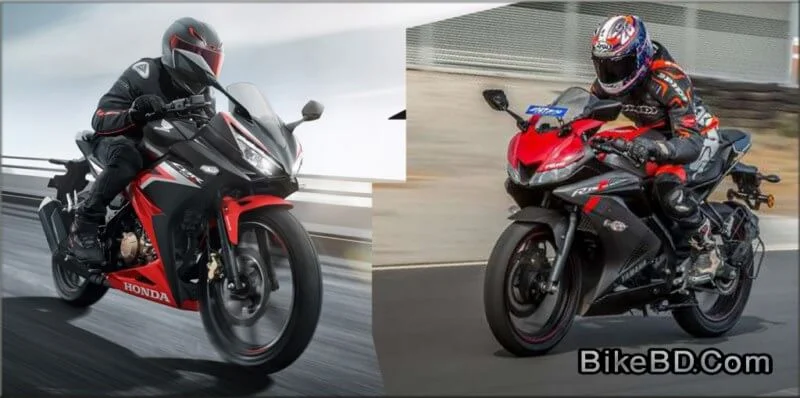 So, readers, you can see both the Honda CBR150R-ABS VS Yamaha R15-V3-ABS got new feature updates. Further both the machines refreshed with new graphics enhancement. Therefore, now you can avail of a new identity including the new performance and safety features. So, the choice is yours, pick your desires sports machine according to your taste.
So, readers, you can see both the Honda CBR150R-ABS VS Yamaha R15-V3-ABS got new feature updates. Further both the machines refreshed with new graphics enhancement. Therefore, now you can avail of a new identity including the new performance and safety features. So, the choice is yours, pick your desires sports machine according to your taste.
I hope you like This Article. Visit our website, Youtube channel and Facebook group to know more about Yamaha user reviews. Not only Yamaha but also other brands motorcycle user reviews are available on our website. Thanks Everyone.














